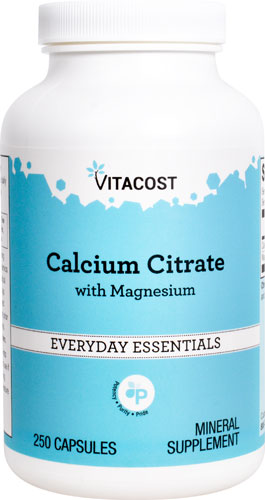There are many ways to take supplements, and some methods are better for certain nutrients. Since vitamins and minerals can play an important part in supporting good health, and since they can also be expensive, you want to be sure to ingest them in a way that allows your body to best assimilate them. Let’s look at how to best supplement your diet with some key nutrients: calcium, iron and vitamin B12.
Calcium
Calcium, an important mineral for your bones and nervous system, is best absorbed if taken in divided doses a few times a day. The human body can’t take in more than it needs at any one time, so taking smaller amounts, rather than one large dose, is more effective. For instance, many women aim for 1,200 to 1,500 mg of calcium daily to support bone health. Taking all of it at once won’t be of much benefit; according to the National Institutes of Health (NIH), calcium is better absorbed when consumed in doses of no more than 500 mg at one time. So if your goal is 1,500 mg a day, it’s best to take 500 mg three times over the course of the day.*
In addition, the type of calcium you take can also influence absorption. Calcium citrate is absorbed well when a person has either a full or an empty stomach, whereas calcium carbonate is best absorbed when taken with food. Note that some people can experience digestive changes - either constipation or diarrhea - from taking calcium supplements. If this happens, try changing the form of calcium you’re taking, or the brand.
Iron
Iron is an important mineral for making red blood cells, and it’s often taken when a person has anemia. Many women with heavy menses take iron regularly to help support healthy iron levels in the body.* Iron is best absorbed when you have adequate stomach acid - which is why those who take antacids (medications that block stomach acid) could have impaired iron absorption. It’s best to take iron with food, since this is when your stomach will produce more acid.
According to the NIH, iron absorption may be impaired if iron is taken at the same time as calcium. Note that iron has the potential to increase the incidence of constipation, and it can change the color of your stools to a dark, almost black color. To mitigate symptoms of constipation, try taking iron in multiple small doses with meals, rather than in a single large dose. Consider trying different types of iron. Some people have fewer side effects with iron supplements that are known as heme iron polypeptides, or iron amino-acid chelates.
Vitamin B12
Vitamin B12, a water-soluble nutrient, is also important in the manufacture of red blood cells. It serves other important functions in the body as well, and helps to support the health of your brain and nervous system.* To be absorbed, vitamin B12 requires a key compound in the body, called intrinsic factor (IF). Your own stomach releases IF from specialized cells known as parietal cells. IF binds to B12, and allows for its absorption in your small intestine. You could have impaired B12 absorption if you have low stomach acid or an autoimmune condition called pernicious anemia that can inhibit the release of IF.*
Vitamin B12 is typically taken as an oral pill, but some people may benefit from taking it as a sublingual (under the tongue) pill or liquid. Studies are mixed about the extent to which it’s better absorbed through this method, but clearly those with impaired absorption from low stomach acid or pernicious anemia may benefit.* The sublingual method is also great for those who have trouble swallowing pills. There are different forms of B12, including hydroxycobalamin and methylcobalamin, available in a raspberry-flavored liquid that can be dropped under the tongue.
In order to get the most out of your nutritional supplements, take them at the best time of day, with or without food - depending on what’s most effective for a particular nutrient - and use the most appropriate method for you and your health.
*These statements have not been evaluated by the FDA. These products are not intended to diagnose, treat, cure or prevent any disease.




